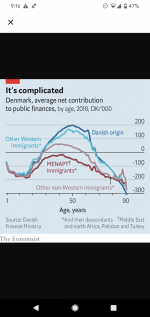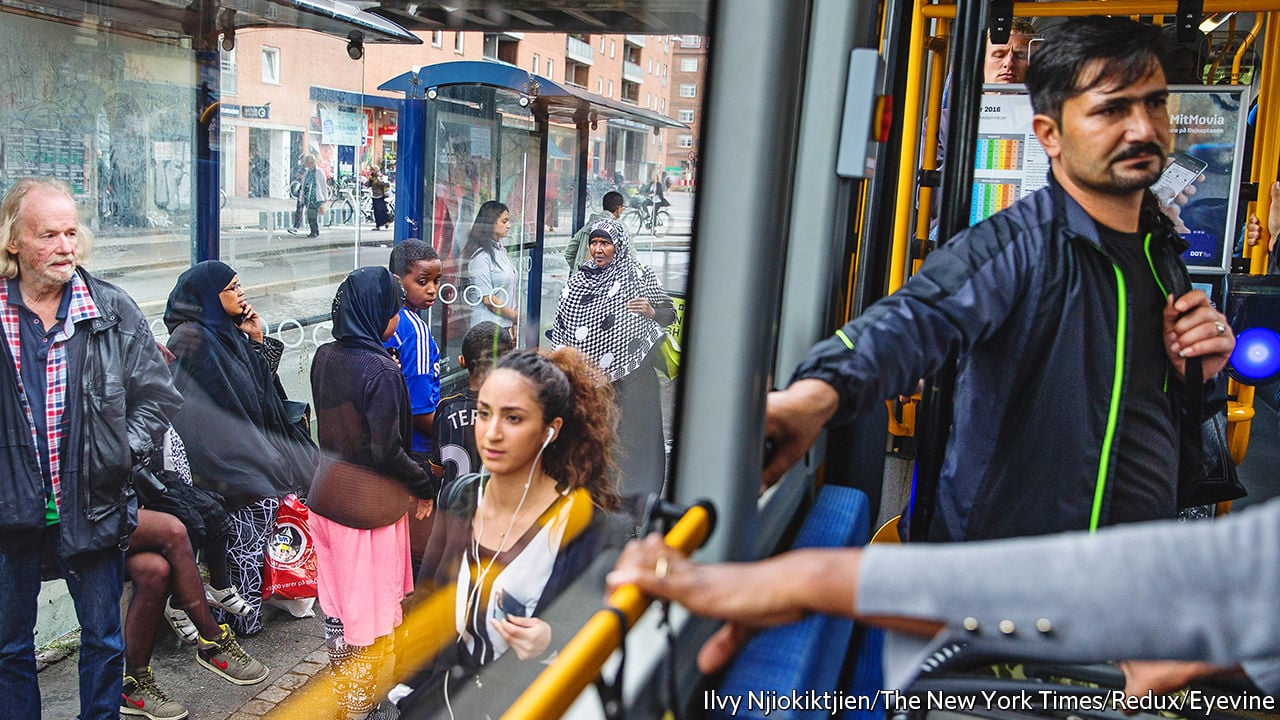Man hat drei Artikel im Monat (osä) frei, danach paywall.
Ein wesentlicher Teil des Artikels ist die Grafik:

Zunächst mal finde ich sehr gut, dass ein Land da mal Daten erhebt, um Licht ins Dunkel der "wie teuer sind bestimmte Einwanderer"-Debatte zu bringen.
Man sieht, dass die "MENAPT"-Gruppe pro Jahr mehr als 100k DKK kostet. Das sind mehr als €13k pro Jahr und Migrant.
Und da sind die (vermutlich nicht soo zahlreichen) Migranten, die für einen gut bezahlten Job und/oder Universität nach Dänemark kamen, schon dabei. Absehbar also, dass die 2015er+-Gruppe noch teurer ist.
Aber selbst wenn nicht -- €13k pro Jahr und Person sind krass und bestätigen eben die begründete Vermutung, dass unqualifizierte Migration auch für Deutschland mega teuer ist.
Insofern verwundert mich nicht, dass Gustavo den Artikel mit einem Einzeiler abtut

Hier der Artikel:
"Denmark is hardly the only country to pull up the drawbridge. Europe suffered political convulsions after an influx of refugees in 2015; most governments are eager to avoid a repeat. But in some ways Denmark stands out. Unlike their counterparts in Hungary, say, its politicians do not denounce immigrants to distract attention from their own failings. Denmark differs from neighbouring Sweden, which in 2015 took in more Syrian asylum-seekers as a share of its population than any other European country except Turkey. Sweden “cherishes multiculturalism”, says Tina Gudrun Jensen, an anthropologist at Malmo University. “In Denmark multiculturalism is really a negative word.”
This approach is earning Danes a bad press. “Denmark leading the race to the bottom” ran a recent headline. But for some governments it is a role model. Mattias Tesfaye, the immigration and integration minister, said recently that he had just hosted a delegation from Greece and expected one from Austria. Britain has reportedly talked to Denmark about co-operating to process asylum applications in some faraway place such as Rwanda. Even Sweden is becoming more like its southern neighbour.
The Danish difference has deep roots. After the Danish crown lost the largely German-speaking duchies of Schleswig and Holstein to Prussia in 1864 it drew the lesson that the country must “stick together [and] be homogeneous”, says Ulf Hedetoft, a scholar of nationalism at the University of Copenhagen. A law two years later stipulated that only people who spoke Danish and wore Danish clothes could become Danes. It is still difficult. mipex, an index that ranks countries according to how well policies promote integration of immigrants, scores the access Denmark gives to citizenship as a “halfway favourable” 41, compared with Sweden’s “favourable” 83.
In the 1960s and 1970s Denmark recruited “guest workers”; refugees from Vietnam and Iran came in the 1970s and 1980s. The welcome waned in the 1990s with the arrival of refugees from the war in what had been Yugoslavia. The nationalist Danish People’s Party (df), founded in 1995, agitated to shut the door on them. In 2001 it backed a conservative-liberal government, which devised today’s two-pronged strategy of repelling would-be migrants and remoulding those who settle.
Its policies included lengthening immigrants’ wait for permanent residency from three years to seven and ending schools’ obligation to teach in pupils’ mother tongues. To bolster Danishness it introduced “canons” of culture, history and democracy into the school curriculum. Without such steps “it would have been really catastrophic”, says Peter Skaarup, the df’s parliamentary leader.
In Sweden, such sentiments are spreading; in Denmark they are now conventional wisdom. “The social democratic welfare state can only survive if we have migration under control,” says Mr Tesfaye, whose father was a refugee from Ethiopia. Denmark may be the world’s second-happiest country, according to a recent survey, but its happiness feels fragile.
Denmark’s defence of its welfare state is ruthless and, say critics, racist. In October the finance ministry, in its annual report on the issue, estimated that in 2018 immigrants from non-Western countries and their descendants drained from public finances a net 31bn kroner ($4.9bn), some 1.4% of gdp. Immigrants from Western countries, by contrast, contributed a net 7bn kroner (see chart). Data on immigration’s fiscal effects were what “changed the Social Democrats’ point of view”, says Torben Tranaes of the Danish Centre for Social Science Research.
Muslims are at the core of the issue. This year was the first time the ministry reported separately on the contributions by people from 24 Muslim countries. They account for 50% of the non-Westerners, but 77% of the drain. Alongside that worry are fears that Muslims bring notions about democracy and the role of women that Danes find threatening. Muslims are welcome, says Mr Tesfaye, but, “We can’t meet in the middle. It’s not half sharia and half the Danish constitution.”
To Muslim ears that sounds like bias. A law passed in 2018, aimed at conservative Muslims, obliges new citizens to shake hands with a municipal official in naturalisation ceremonies. Politicians “make you feel like you have to not celebrate Ramadan or Eid or anything”, says Agob Yacoub, a Syrian refugee. Other groups are not subject to such pressure. Chinese immigrants have not become culturally Danish but are nonetheless “extremely welcome”, notes Mr Hedetoft. The Muslims’ drain on the treasury probably has little to do with religion. More than half came as asylum-seekers or through family reunification, compared with 30% of other non-Westerners.
Like its Scandinavian neighbours, Denmark enrols new migrants in programmes that include language and civics classes. But its benefits system is, characteristically, a bit tougher. Payments are lower for people who have not lived in the country for seven out of eight years. This serves both to deter immigrants and to encourage those who do settle to work. Denmark can boast that the gap in unemployment between natives and non-European immigrants is smaller than Sweden’s. But that may be in part because Sweden has higher effective minimum wages in relation to its average wage, which prices many new immigrants out of jobs, especially if they do not speak Swedish well.
The justification for breaking up neighbourhoods like Mjolnerparken seems flimsy. Its parallel-society status is based in part on the fact that 2.69% of its residents had a criminal conviction a couple of years ago. The allowable limit is 2.35%. The number of young men involved in crime is “less and less every year”, believes Majken Felle, a primary-school teacher who lives in one of the blocks slated for sale. Far from forming a parallel society, Mjolnerparken’s Muslims come from many countries and speak to each other in Danish; it is the younger generation’s mother tongue.
The example of Malak Tumeh, a medical student, is a rebuke to Danes who think Muslims do not belong, but should also give pause to those who think Denmark’s monoculturalism will inevitably alienate them. The daughter of an Iraqi mother and Palestinian father, she arrived in Denmark in 2001 at four months old. Without residence permits her parents could not work in their professions (her mother trained as a microbiologist, her father was a biochemist). He sold pizza and worked in construction to make ends meet. When Ms Tumeh was six, police searched her home for fake passports; they “yanked” her by her bag, she says. Religious studies at school centred on Christianity.
Yet Denmark and the Tumehs have adapted to each other. Religion teachers “asked my parents to share their experiences with Islam”, says Ms Tumeh. They brought a Koran to class. Ms Tumeh and her father finally became permanent residents in 2020; her father got citizenship last year. Not yet a citizen herself, Ms Tumeh considers herself to be Danish. “The past could have been easier, but it’s still a good life, better than many people could imagine,” she says. It is not easy to become a new Dane. But for the few that do, the struggle is worthwhile. "
Dabei sei gesagt, dass der Economist sehr pro Migration ist. Sieht man ja auch an der typischen Einzelschicksal-Geschichte am Ende, die angeblich etwas "rebuked".
Was ich in Dänemark etwas heavy handed finde sind die Eingriffe in Stadtviertel. Da würde ich gerne die Evidenz sehen, dass das etwas bringt.
Aber die dänischen Maßnahmen, damit das Problem nicht noch schneller noch größer wird sind sinnvoll: Erschwerung des Erlangens der Staatsbürgerschaft, Fokus auf Rückführung, transparente Daten und eine offene Debatte.








 Viel mehr wird es plumpe Unachtsamkeit sein, weil es in solchen Fällen in erster Linie egal ist. Es geht grundlegend um die Anzahl der Suchenden und eine etwaige Prüfung auf Asyl wird jeder durchlaufen müssen.
Viel mehr wird es plumpe Unachtsamkeit sein, weil es in solchen Fällen in erster Linie egal ist. Es geht grundlegend um die Anzahl der Suchenden und eine etwaige Prüfung auf Asyl wird jeder durchlaufen müssen.